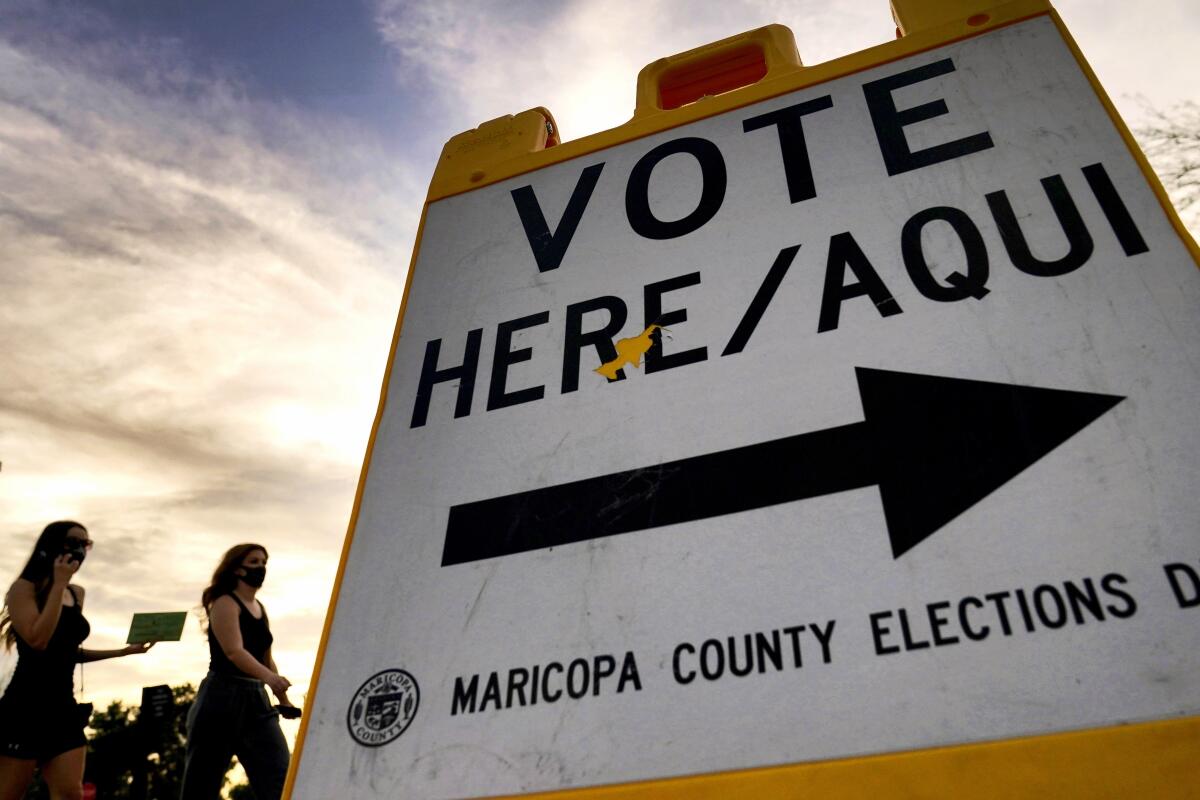Arizona judge rejects GOP request to block voting by mail

PHOENIX — An Arizona judge Monday declined a request by the state Republican Party to block most mail-in ballots for the 2022 election, preserving the voting method used by an overwhelming majority of the state’s voters.
Mohave County Superior Court Judge Lee Jantzen ruled that nothing in the Arizona Constitution prohibits the Legislature from allowing citizens to vote by mail.
The case is the latest piece of a multi-pronged effort by the Arizona Republican Party and its firebrand chair, Kelli Ward, to roll back a system of no-excuse-needed absentee voting that the GOP-controlled Legislature has built since 1991. They’ve pushed to require nearly everyone to cast a ballot in person on election day as former President Trump repeats the lie that he lost the 2020 election because of fraud linked to mail ballots in Arizona and other battleground states.
Arizona is among the states with the highest levels of mail voting, a system that has become extremely popular with voters from both parties as well as independents. Striking down those laws would have had major implications for the 2022 election in Arizona, which includes one of the handful of races that will determine which party controls the U.S. Senate.
Attorneys for Ward and the GOP argued that voting by mail is inconsistent with the Arizona Constitution’s requirement for a secret ballot. Attorney Alex Kolodin contended that several clauses in the Constitution, taken together, prove that the framers intended to ban mail ballots.
Only the voters, not the Legislature, can authorize voting by mail by amending the Arizona Constitution, Kolodin argued in court last week.
Donald Trump has endorsed investor Blake Masters in the crowded Republican Senate primary in Arizona.
Lawyers for state and county election officials, as well as state and national Democratic Party committees, said the vote-by-mail laws have plenty of secrecy safeguards built in. Jantzen, who was appointed by former Republican Gov. Jan Brewer, agreed.
“The laws are far from perfect and nobody anticipated thirty years ago that approximately 90 percent of Arizona voters would vote by mail-in ballot during a pandemic, but these laws are NOT in violation of the Arizona Constitution,” Jantzen wrote.
Ward and the state GOP originally filed their lawsuit directly with the Arizona Supreme Court earlier this year, a highly unusual step, but the justices said it should go through a trial court first and they would only consider it on appeal. The plaintiffs refiled the case last month in Mohave County, the most conservative county in the state, where Trump got 75% of the vote in 2020.
Republican Atty. Gen. Mark Brnovich, who has earned Trump’s ire for failing to more aggressively advance the former president’s falsehoods about the 2020 election, declined to defend the mail voting laws in court. Brnovich is running in a crowded GOP primary for U.S. Senate.
Ten of millions of people in the United States opted for mail ballots during the pandemic election of 2020.
With Brnovich on the sidelines, the law was instead defended by lawyers hired by Secretary of State Katie Hobbs, a Democrat, along with the Maricopa County Attorney’s Office, which represented seven county recorders. The Arizona Democratic Party and three national Democratic Party organizations also intervened in defense of the law.
“Arizona Democrats defended democracy and won, striking down the AZ GOP’s shameful, embarrassing, and unconstitutional effort to try and end early voting in our state,” Arizona Democratic Party Chair Raquel Teran said in a statement.
The Arizona Republican Party said in a statement late Monday that it was exploring its next steps, including a possible appeal.
“We knew going in that asking a superior court judge to take it upon itself to strike down this unconstitutional system was a big ask,” the statement said.
More to Read
Sign up for Essential California
The most important California stories and recommendations in your inbox every morning.
You may occasionally receive promotional content from the Los Angeles Times.












